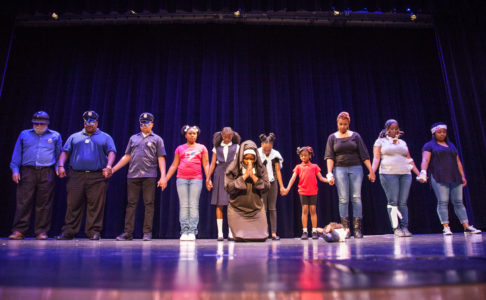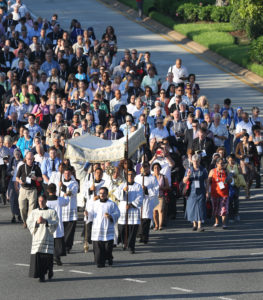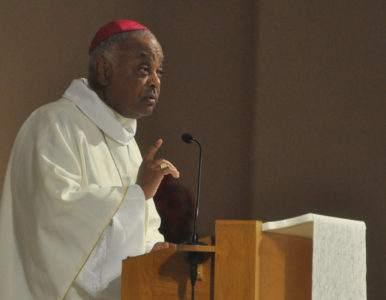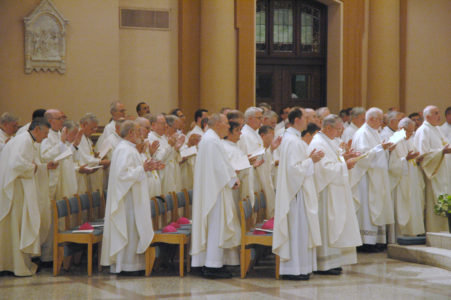By Kathryn Ziesig
ST. LOUIS – Those are the words by which Sister Mary Antona Ebo continues to live and those by which she was celebrated at a presentation July 30 at the Missouri History Museum in St. Louis.
Music, poetry and acting, peppered with photos and past video interviews with the Franciscan Sister of Mary and civil rights icon, were woven into a nearly two-hour program to recognize Sister Ebo. She’s most famous for her role in the 1965 march in Selma, Ala., for voting rights for blacks, but also known for her groundbreaking ministry as a woman religious and in health care. From 1981-1987 she worked at University Medical Center in Jackson as a chaplain.
The 93-year-old guest of honor was unable to be present, and instead watched the event at home via livestream with a small group of family and friends. Throughout the program the crowd cheered her, with some yelling out “Ebo!” as they turned toward the video camera to greet Sister Ebo at home.
Just as important was the message of how the local community must stay engaged in the movement for racial justice post-Ferguson, and doing so through Sister Ebo’s example — which is brightly illuminated by her Catholic faith.
“This was all about demonstrating the completeness of her life,” said Philip Deitch, a longtime friend of Sister Ebo’s who organized the program. Her example doesn’t solely lie in the the moments at Selma, he said, but also through her leadership roles in health care and even within her religious community.
“You don’t get to sit back and say ‘I’ve done enough,’” Deitch said. “If there’s still an issue that needs work and you can do something — do something. None of us have the right to sit back and say we’ve done enough, and that’s what I have learned from her.”
Sister Ebo was a trailblazer in many aspects. She was among the first group of African-Americans to enter the Sisters of St. Mary (now Franciscan Sisters of Mary) in 1946. She continued that in her ministry in hospital administration, joining then-segregated St. Mary’s Infirmary in St. Louis. She later became administrator of St. Clare Hospital in Baraboo, Wis., becoming the first African-American to lead a hospital in the state of Wisconsin.
Over the years, she became involved in interfaith work and other social justice issues. In 2014, she visited Ferguson after the death of Michael Brown, in which she told others that they must “raise the rug up and look at what’s under the rug” in Ferguson.
Several videos of Sister Ebo speaking in the past decade, which were shown at the program, demonstrated that her words are just as relevant today.
“My favorite words out of Isaiah 55 are ‘come, listen, live and witness,’” she said in a 2006 awards ceremony. “Those were the words that were represented when we as a group went to Selma. … We choose life for ourselves and our people and that’s what it’s all about. The call was to come to listen to one another — that’s where our unity comes from. By knowing one another, (to) listen to one another, and then bring forth new life.”
Father Art Cavitt of the St. Charles Lwanga Center, who spoke at the History Museum event, said that Sister Ebo encompasses “all the tenets of the Gospel. It’s coming, it’s listening, it’s acting, it’s living, it’s testifying. It’s keeping God in the picture as we integrate practically what it is we’re going to do for justice and in education and equality and all those things.”
Others must live up to what Jesus calls us to do in spreading the Gospel message, which has always been Sister Ebo’s example, said Frederick and Teresa Scurloch, friends of Sister Ebo’s from her home parish, St. Matthew Parish in the Ville neighborhood of north St. Louis. Members of the St. Matthew and several other nearby parishes sang at the event.
(Story and photos reprinted with permission from the St. Louis Review, the newspaper for the Archdiocese of St. Louis.)

Kathryn Ziesig | kathrynziesig@archstl.org | instagram: kziesigphoto
Marie Janet Turner, portraying Sister Antona Ebo, FSM, knelt in front of the protesters and police during the play “God’s Witness” at the Missouri History Museum on July 30 during the tribute event for Sr. Ebo. The play was inspired by the events that occurred in Selma in 1965. The play’s writer and director Madeline Jackson said that while the police did not put down their weapons and the protestors didn’t put down their signs during the Selma marches she hopes that one day this will be the solution.




